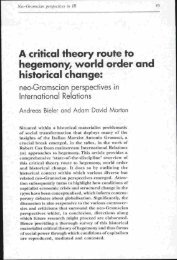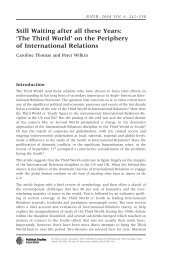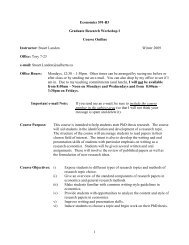Is comparative politics dead? Rethinking the field in the post-Cold ...
Is comparative politics dead? Rethinking the field in the post-Cold ...
Is comparative politics dead? Rethinking the field in the post-Cold ...
You also want an ePaper? Increase the reach of your titles
YUMPU automatically turns print PDFs into web optimized ePapers that Google loves.
HOWARD J WIARDAparty system has emerged, and <strong>in</strong> all three countries <strong>the</strong>re have been at least twoelections <strong>in</strong> which power has passed peacefully to <strong>the</strong> oppositionÐ usuallythought of as a key <strong>in</strong>dicator of <strong>the</strong> consolidation of democracy.All three countries are now members of <strong>the</strong> EUC and NATO. Per capita <strong>in</strong>comehas risen to roughly 70% of <strong>the</strong> European average and a stable middle class hasemerged. Ideological passions have cooled, depoliticisation has taken place andconsumerism has triumphed. Socialist governments carry out neoliberal economicpolicies while right-of-centre governments expand social welfare. Democracy’s triumph has been so de® nitive and enjoys such high legitimacy that aleft-w<strong>in</strong>g revolution or a right-w<strong>in</strong>g coup are unth<strong>in</strong>kable. All <strong>the</strong> great systemsissues have been resolved; <strong>politics</strong> revolves around `more or less’ (a little lesssocial welfare, a little more privatisation, or vice versa) ra<strong>the</strong>r than <strong>the</strong> make-orbreakissues of <strong>the</strong> past. As elsewhere <strong>in</strong> Europe, <strong>the</strong>re is widespread consensuson democracy, employment, stability, welfare, markets, cont<strong>in</strong>ued growth, consumerismand someth<strong>in</strong>g ak<strong>in</strong> to a guaranteed <strong>in</strong>come. Arguments still occuraround <strong>the</strong> marg<strong>in</strong>s of <strong>the</strong>se issues but not on <strong>the</strong> basics. 22Some parallel developments have occurred <strong>in</strong> Asia. First, <strong>the</strong> authoritarianpolitical systems of earlier decades <strong>in</strong> South Korea, Taiwan and S<strong>in</strong>gapore havebecome more open, democratic, and pluralist. Second and relatedly, <strong>the</strong> authoritarian,state corporatism of <strong>the</strong> past has become more participatory and sociallyjust (`societal corporatism’ ). Third, <strong>the</strong> economies of <strong>the</strong> area boomed: <strong>the</strong> fourAsian Tigers (Hong Kong, S<strong>in</strong>gapore, South Korea and Taiwan) became NICsand began to challenge <strong>the</strong> already <strong>in</strong>dustrialised nations on several economicfronts. Fourth, this economic boom spread to o<strong>the</strong>r, previously less-developedcountries (Indonesia, Malaysia, The Philipp<strong>in</strong>es, Laos, Thailand); while, ® fth,even such communist countries as Ch<strong>in</strong>a and Vietnam have seen <strong>the</strong> bene® ts ofopen<strong>in</strong>g <strong>the</strong>ir markets even as <strong>the</strong>y still utilise <strong>the</strong> political controls of acommand regime. Sixth, India has now been a political democracy for 50 years;recently, and look<strong>in</strong>g at <strong>the</strong> example of its Asian neighbours, it has taken stepsto reform and free up its economy as well. Thus, <strong>in</strong> both <strong>the</strong> political and <strong>the</strong>economic realms, <strong>the</strong> future path <strong>in</strong> Asia, despite recent and probably temporarydownturns, seems clear: greater pluralism and democracy coupled with acomb<strong>in</strong>ed statist±bureaucratic and more open-market system. 23A personal anecdote may help illustrate <strong>the</strong> po<strong>in</strong>t. In 1987 <strong>the</strong> author andSoviet Union specialist Jerry Hough were part of an academic delegation visit<strong>in</strong>gS<strong>in</strong>gapore. In a variation on <strong>the</strong> `mouse that roared’ <strong>the</strong>me, Hough madefront-page headl<strong>in</strong>es <strong>in</strong> all <strong>the</strong> S<strong>in</strong>gapore newspapers by claim<strong>in</strong>gÐ with only alittle hyperboleÐ that it was `little’ S<strong>in</strong>gapore that had won <strong>the</strong> <strong>Cold</strong> War! Heargued that it was <strong>the</strong> dynamism and success of <strong>the</strong> S<strong>in</strong>gapore economy (and thatof <strong>the</strong> o<strong>the</strong>r Asian Tigers) that had shown to <strong>the</strong> Soviets, o<strong>the</strong>r develop<strong>in</strong>gcountries, and <strong>the</strong> world that market capitalism was far more productive andsuperior to Marxist±Len<strong>in</strong>ist economies. One can see why this assessment wasso well received by <strong>the</strong> S<strong>in</strong>gapore press: city-state-sized S<strong>in</strong>gapore had becomea model for <strong>the</strong> world.Lat<strong>in</strong> America’ s political systems are more fragile than those of Sou<strong>the</strong>rnEurope and its economies less developed, but many of <strong>the</strong> same trends present<strong>in</strong> Spa<strong>in</strong>, Portugal, Greece and even Asia are also present <strong>in</strong> Lat<strong>in</strong> America.940
















